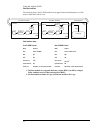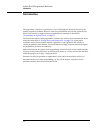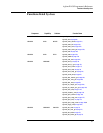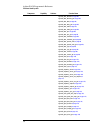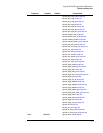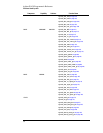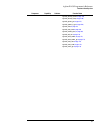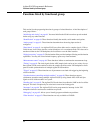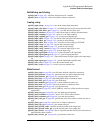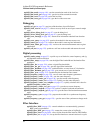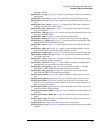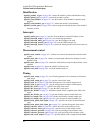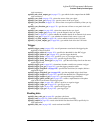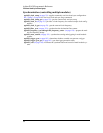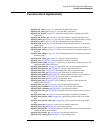
60
Agilent E1439 Programmer's Reference
Functions listed by functional group
Functions listed by functional group
This section lists the programing functions in groups of related functions. A brief description of
each group follows:
“Initializing and closing” on page 61: You must initialize the I/O driver and set up each module
before using any other functions.
“Identification” on page 64: These functions identify the module, serial number and options.
“Analog setup” on page 61: These functions determine how the analog input section is
configured.
“Data format” on page 61: An Agilent E1439 can collect either real or complex data in 12-bit or
24-bit format. It can collect data into various blocksizes or in a continuous mode. This data can be
transferred either on the VXI backplane, the Local Bus or over the fiber interface.
“Digital processing” on page 62: The decimation filter provides bandpass filtering and decimation
capabilities. You may also select limited frequency spans away from baseband.
“Measurement control” on page 64: These functions initiate or terminate the measurement loop.
“Timing” on page 64: The clock signals for the ADC sample clock can be set in a variety of ways.
One Agilent E1439 can be enabled to drive the sample clock line on the VXI backplane or front
panel to enable synchronization of multiple Agilent E1439 modules.
“Trigger” on page 65: These functions set all parameters associated with triggering the beginning
of data collection.
“Synchronization (controlling multiple modules)” on page 66: These functions support
synchronous operation among multiple Agilent E1439s by using shared ADC clock and Sync
signals to drive all the modules in a system.
“Reading data” on page 65: The Agilent E1439 reads data from either the VME or the Local Bus
data port. This data can optionally be scaled and converted to floating point.
“Interrupts” on page 64: The Agilent E1439 can be programmed to interrupt via the VXI
backplane whenever certain status conditions are present.
“Debugging” on page 62: Allows you to identify program and hardware problems.
“Fiber Interface” on page 62: These functions are only available on E1439D.



